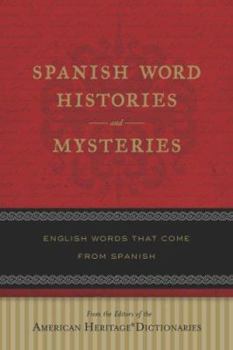Spanish Word Histories and Mysteries: English Words That Come from Spanish
Select Format
Select Condition 
Book Overview
Most people know that words like burrito and quesadilla come from Spanish, but there are many more English words that we would never suspect are Spanish until we look closely. Did you know that the words breeze and hammock come from Spanish? The jerky in beef jerky, for example, is from Spanish charqu?, and the English verb vamoose is from the expression ?Vamos! which means Let's go! in Spanish.
Spanish Word Histories and Mysteries: English Words that Come from Spanish tells the fascinating stories behind 200 English words from Spanish. Every sphere of English vocabulary has been enriched by Spanish, from names for animals--alligator, coyote, and mosquito--to words for weather--hurricane and tornado. This book also explores the Spanish origin of some of the colorful expressions of the Old West: bonanza, loco, mustang, ranch, and ten-gallon hat. Of course, the book digs into the many words for different foods that come from Spanish--not only the obvious ones, such as salsa and taco, but also potato, tomato, caramel, vanilla, and, most important, chocolate. Photographs and line drawings enliven the pages and illustrate the history of the words.
Spanish Word Histories and Mysteries: English Words that Come from Spanish tells the fascinating stories behind 200 English words from Spanish. Every sphere of English vocabulary has been enriched by Spanish, from names for animals--alligator, coyote, and mosquito--to words for weather--hurricane and tornado. This book also explores the Spanish origin of some of the colorful expressions of the Old West: bonanza, loco, mustang, ranch, and ten-gallon hat. Of course, the book digs into the many words for different foods that come from Spanish--not only the obvious ones, such as salsa and taco, but also potato, tomato, caramel, vanilla, and, most important, chocolate. Photographs and line drawings enliven the pages and illustrate the history of the words.
Format:Paperback
Language:English
ISBN:0618910549
ISBN13:9780618910540
Release Date:November 2007
Publisher:Collins Reference
Length:240 Pages
Weight:0.70 lbs.
Dimensions:0.6" x 5.8" x 8.2"
Customer Reviews
3 ratings
EVERYDAY ESPANOL
Published by Thriftbooks.com User , 17 years ago
A very good book for beginning Espanol students, and for those who simply enjoy language, and want to knoow how we came to form our modern day Ingles. Words we use everyday like chocolate, alligator, barbeque, lariat, hammock, embargo, etc. can all be traced back to the Spanish and in many cases, to the occupying Muslim forces in Spain. I have found over three hundred words in the Filipino Talalog language that can be traced back to the colonial Spanish days. The Spanish not only contributed music and dancing, food and customs, plants and gardening, names and religion, but also many words into the world of languages. A nice, valuable piece of work by American Heritage - easy reading. I liked it and so did my 16-yoa daughter who enjoys anything Spanish.
Great for any reader -- even bilingual speakers of Spanish and English
Published by Thriftbooks.com User , 17 years ago
I could not disagree more with the reviewer who states that this "book is too basic for bilingual Spanish-English speakers. . . overall fluent Spanish speakers will find little of interest. Instead, it's a very good book for beginner Spanish speakers who want to know more about the language." I have been a professor of Spanish and Latin American Literature for over ten years and am perfectly bilingual and find this book to be very interesting and entertaining. There are many words here whose origins I did not previously know. Indeed, how many native Spanish speakers realize that barracuda most likely comes from barracó -- a word from the dialect of Catalan spoken in the region of Valencia that essentially means "snaggletooth". Even the American Heritage Dictionary states that barracuda is of unknown origin. This is great reading that will please anyone interested in etymology.
A book that delivers, but only for some
Published by Thriftbooks.com User , 17 years ago
I originally bought this book to give to a bilingual friend who is interested in language and word origins. The book is well written, informative and entertaining. However, when I started going through it, I realized that the book is too basic for bilingual Spanish-English speakers. There are a few surprises (barrio has an Arabic origin!) but overall fluent Spanish speakers will find little of interest. Instead, it's a very good book for beginner Spanish speakers who want to know more about the language, or for anybody interested in the history of words used everyday in the US.






